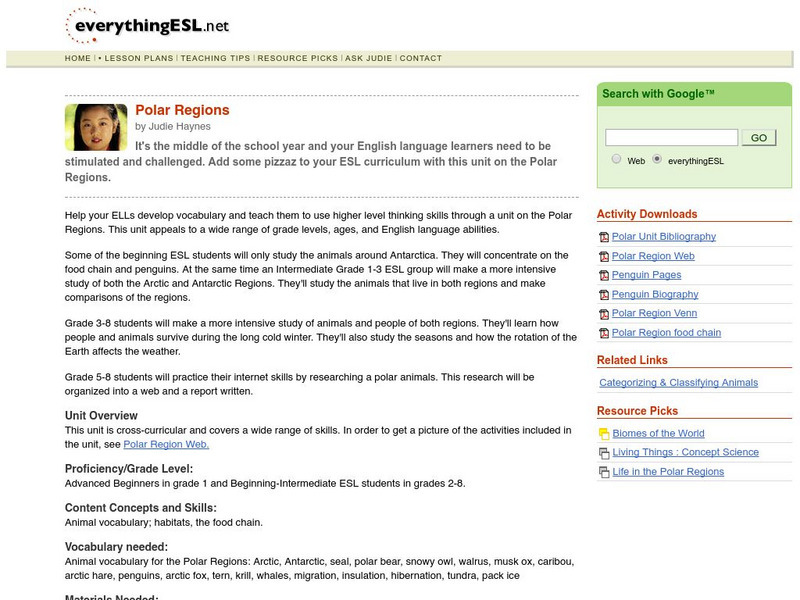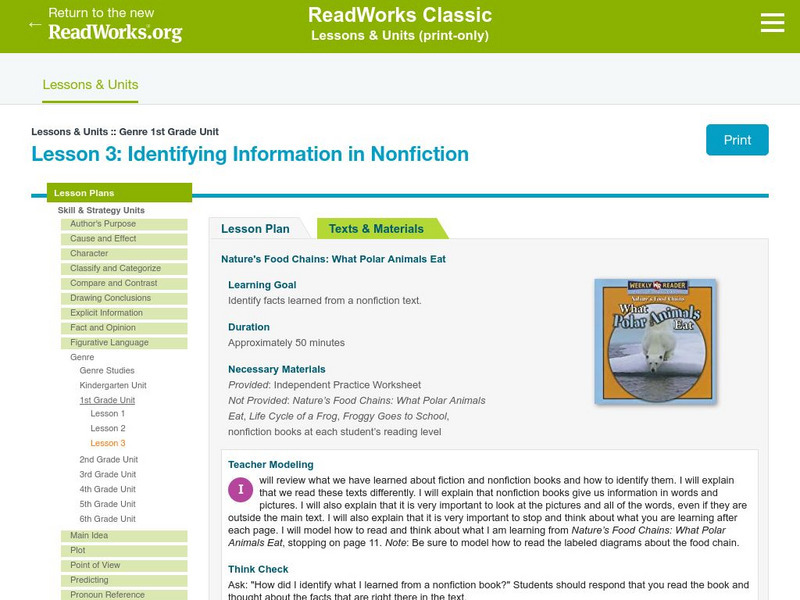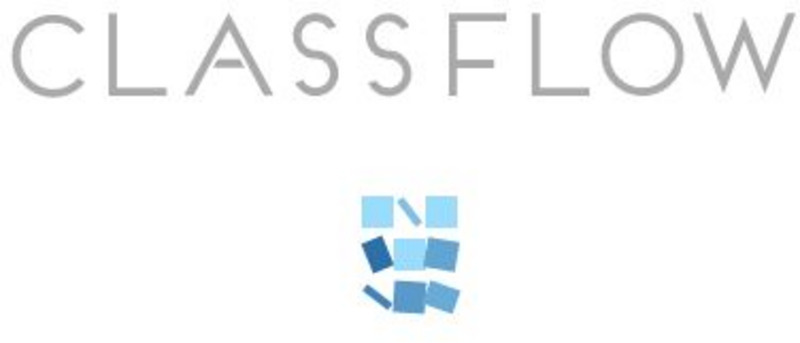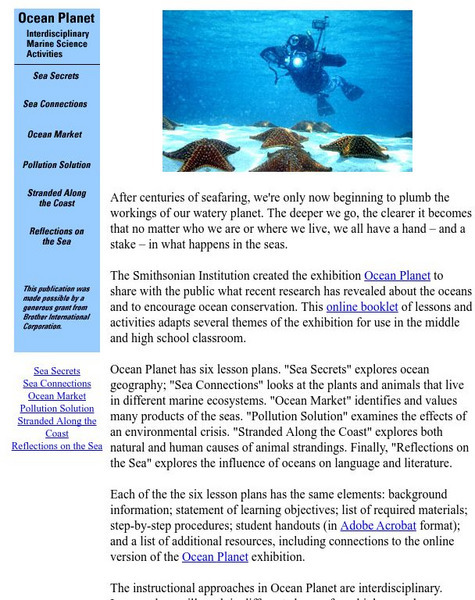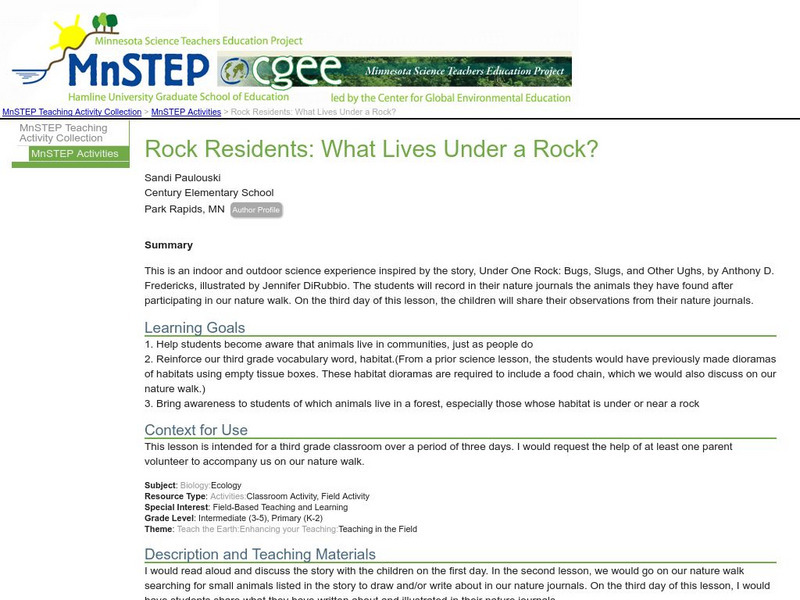Hi, what do you want to do?
US Geological Survey
Lake Pontchartrain Basin Foundation: Ecosystems in Delicate Balance
Learning activities to investigate how organisms interact in a functioning ecosystem. Students will explore the role organisms play in food chains and preserving biodiversity in ecosystems. Lake Pontchartrain Basin ecosystem is featured...
Everything ESL
Animal Habitats: The Polar Regions
Stimulate and challenge your ESL students with a unit on Polar regions. Students will use higher level thinking skills while learning about animals, habitats and food chains. You will find many downloadable pages.
Smithsonian Institution
Smithsonian National Zoo: Zoogoer Magazine: Sharks, in Deep
Howard Youth, in his article for Zoogoer Magazine entitled "Sharks, In Deep," examines a range of topics related to sharks including Shark Basics, Troubled Waters, Reaching for Limits, Bites Out of the Food Chain, Discovering Sharks, and...
Read Works
Read Works: Genre 1st Grade Unit: Identifying Information in Nonfiction
[Free Registration/Login Required] A lesson in which students use the books Nature's Food Chains: What Polar Animals Eat by Joanne Mattern, Life Cycle of a Frog by Angela Royston, and Froggy Goes to School by Jonathan London to learn to...
Read Works
Read Works: 1st Grade Lesson: Purposes for Reading
[Free Registration/Login Required] A lesson in which students use the books Nature's Food Chains: What Polar Animals Eat by Joanne Mattern, Life Cycle of a Frog by Angela Royston, and Froggy Goes to School by Jonathan London to learn to...
Science Struck
Science Struck: A Helpful Guide to Understand the Photic Zone
The photic zone is the upper layer of the ocean where sunlight can penetrate and support photosynthesis. This article explains the characteristics of this zone, the food chain that exists there, the adaptations of the plants and animals,...
CK-12 Foundation
Ck 12: Life Science: 12.19 Energy Flow
Learn how energy is transferred along a food chain.
ClassFlow
Class Flow: Animals: Food Chains, Characteristics, and Habitats Around the Worl
[Free Registration/Login Required] This flipchart is a great introduction to ways animals get food, characteristics of animals, habitats around the world. It contains pictures that will help students understand life cycles and where to...
Alabama Learning Exchange
Alex: Exploring Owls
During this instructional activity, students will visit Internet sites to research facts about owls and food chains. They will use this information to complete a picture of an owl food chain, dissect owl pellets, and write a class book...
Smithsonian Institution
Smithsonian Education: Ocean Planet
A series of lesson plans designed to be used with the Smithsonian Ocean Planet exhibit (available online). Lesson topics include marine ecosystems, pollution of ocean water, animal strandings, and literature.
CK-12 Foundation
Ck 12: Earth Science: Flow of Energy in Ecosystems
[Free Registration/Login may be required to access all resource tools.] Describes how energy is transferred from one organism to another.
SMART Technologies
Smart: Energy Flow in an Ecosystem
Students learn about Abiotic and Biotic Factors and how they affect the ecosystem in which an animal might live in.
Open Curriculum
Open Curriculum: Flow of Energy in Ecosystems
Students will understand and describe food chains and food webs, and explain how energy is transferred between their trophic levels.
Other
My Science Box: Food Webs
In this lesson, students will choose an organism of their choice and research its life cycle, food chain, diet, and habitat, then predict how habitat change might affect the organisms living within it.
ClassFlow
Class Flow: What Animals Eat
[Free Registration/Login Required] To show the dependence of animals on the plant world, these flipchart pages contain examples of food chains and food webs, as well as other information about animals and habitats.
Other
Segfl: Sebastian Swan: Pond Web
This interactive ebook "Pond Web" demonstrates a pond food chain. Students can click on the ? to find answers to questions posed in the text. Students are asked to retell the story using pictures provided at the end of the book.
Science Struck
Science Struck: Decomposers in the Ocean: Role and Examples
Describes five different types of decomposers that feed on decaying organic matter in the oceans and that are at the bottom of the ocean food chain.
BiologyWise
Biology Wise: Understanding the Process of Biological Magnification
Biological magnification is the term used to described the increasing accumulation of substances in organisms as one looks at higher trophic levels in a food chain. When that substance is a toxin, such as a heavy metal or a pesticide,...
Missouri Botanical Garden
Missouri Botanical Garden: Food From the Sea
Did you know that 80% of the fish we eat comes from the ocean? Since oceans cover so much of the earth you would think that we would never be in danger of running out of its resources. Learn how overfishing is causing many problems with...
Planet Pals
Planet Pals: Producers
This colorful site examines the food chain and delves into an explanation of what producers are and where they fit in an overall ecosystem.
Science Education Resource Center at Carleton College
Serc: Mn Step: Rock Residents: What Lives Under a Rock?
For this activity, students first listen to a story about animals that live under rocks, then go on an exploratory nature walk to see what animals they can find, living in their own small habitats. They write about their discoveries in a...
Tom Richey
Slide Share: Ecosystems and You
Slideshow that looks at energy flow in an ecosystem. Explains what an ecosystem is, how energy flows through it, the producers and consumers of energy, and food chains. Links to a video about plastic debris in the ocean.
Texas A&M University
Texas A&m University: Fisheries Activities
Site from the Texas A&M University provides activities on fisheries that teachers can use in their classrooms to help students learn more about them. Some of the topics included are ecosystems, ocean food chains, fish prints and more.
Channel 4 Learning
Channel 4 Learning: Science Essentials: Habitats
Find answers to your questions about habitats, producers, consumers, and food chains. Glossary, image bank, suggested activities, and quiz included.
Other popular searches
- Desert Food Chain
- Animal Food Chain
- Deciduous Forest Food Chains
- Pond Food Chain
- Ocean Food Chain
- Frog Food Chain
- Food Chains in Biomes
- Arctic Food Chain
- Desert Animal Food Chain
- Ocean Animals Food Chain
- Coral Reef Food Chain
- Marine Science Food Chain






